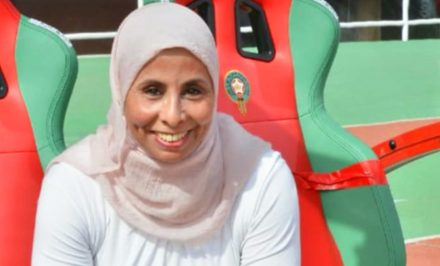 Cameroon : Dr. Yasmine Ndassa, the research scientist turned data storyteller
Cameroon : Dr. Yasmine Ndassa, the research scientist turned data storyteller
 Julien Ngum Che : advocating for the rights of displaced women and youth in Cameroon
Julien Ngum Che : advocating for the rights of displaced women and youth in Cameroon
 Chilufya Mutale Mwila, the Zambian entrepreneur driving financial inclusion across Africa
Chilufya Mutale Mwila, the Zambian entrepreneur driving financial inclusion across Africa
 Wangari Muchiri, the Kenyan engineer committed to accelerating the ecological transition in Africa
Wangari Muchiri, the Kenyan engineer committed to accelerating the ecological transition in Africa


For a long time the preserve of men, Moroccan football refereeing has seen the emergence of women in recent years. Rezzag Khadija was one of the first female football referees in Morocco. In 2004, this former footballer achieved the feat of becoming the first Arab woman international referee to officiate in the men’s national championships. For the past few years, she has been a member of the National Directorate of Referees (DNA) at the Royal Moroccan Football Federation (FRMF), the first woman to be member of that directorate in Morocco.
From football to refereeing, through martial arts and karate, Rezzag Khadija has had a rich and fruitful career in sport. After studying at the Dar es Salam High School in Rabat, she joined the Aeronautical Cabling Company where she worked for 19 years. But she also devoted herself fully to her passion, sport, particularly football and karate.
At a very young age, she practised martial arts and football with the boys in her neighbourhood to measure her physical abilities against theirs. In 1989, she began her career in football, notably with Safaâ Hay Nahda, a neighbourhood team in Rabat, and later joined the Union sportive de Touarga. She played her first match as an international in 1997 in Sweden. « It was an unexpected achievement for a young team,” she recalls. A feat that brought her back to the Arab Cup in Cairo, Egypt, which she won with her team. This cumulative achievement led CAF to request the team’s participation in the African Women’s Cup qualifiers. In 1998, she played with the Lionesses in the final stages of the African Cup of Nations in Nigeria. A memorable date, as it marked the establishment of the practice of football by women in Morocco.
« I was able to familiarise people with the presence of women referees »
Along with her football career, she embarked on refereeing. In the absence of a women’s football championship in Morocco in the late 90s, and to remain attached to her favourite sport, football, she joined the Gharb Refereeing School in Rabat, taking advantage of the director’s decision to open the school’s doors to girls in 1995. In parallel to her training, she regularly trained with male referees. “They and the league members were very happy to see a talented and courageous girl among them and predicted that I would be successful in this field,” she says.
With her degree in football refereeing in hand, she joined the Moroccan refereeing scene. A « male » field where she proved herself and changed mentalities. In 2004, she was the first international Arab woman to referee the men’s first division in Morocco. In 2005, she became an international referee and was named « Best Referee » at the Arab Championship the same year. She was also named 4th referee during the Arab Club Championship.
“Refereeing men’s matches with great physical and technical performance was a great achievement. I was able to change the look from exclamation, doubt, and sometimes contempt, to a look of admiration, respect and appreciation. I was able to familiarize people with the presence of women as a referee and change the mindset about the performance of women in the stadiums, “ she says.
In 2007, she ended her career as a referee to devote herself to the framing and development of women’s refereeing in Morocco and Africa. She joined the National Directorate of Referees (DNA) within the Royal Moroccan Football Federation (FRMF) where she is still in charge of Moroccan women referees and works hard to train referees “who can follow in the footsteps of the greatest African referees such as the Moroccan Belqoula and the Senegalese Malang, who refereed the World Cup finals”, she stresses.
Khadija Rezzag is also a technical instructor for the African Football Confederation (AFC), an AFC assessor and a member of the Panel in charge of the development of African refereeing.